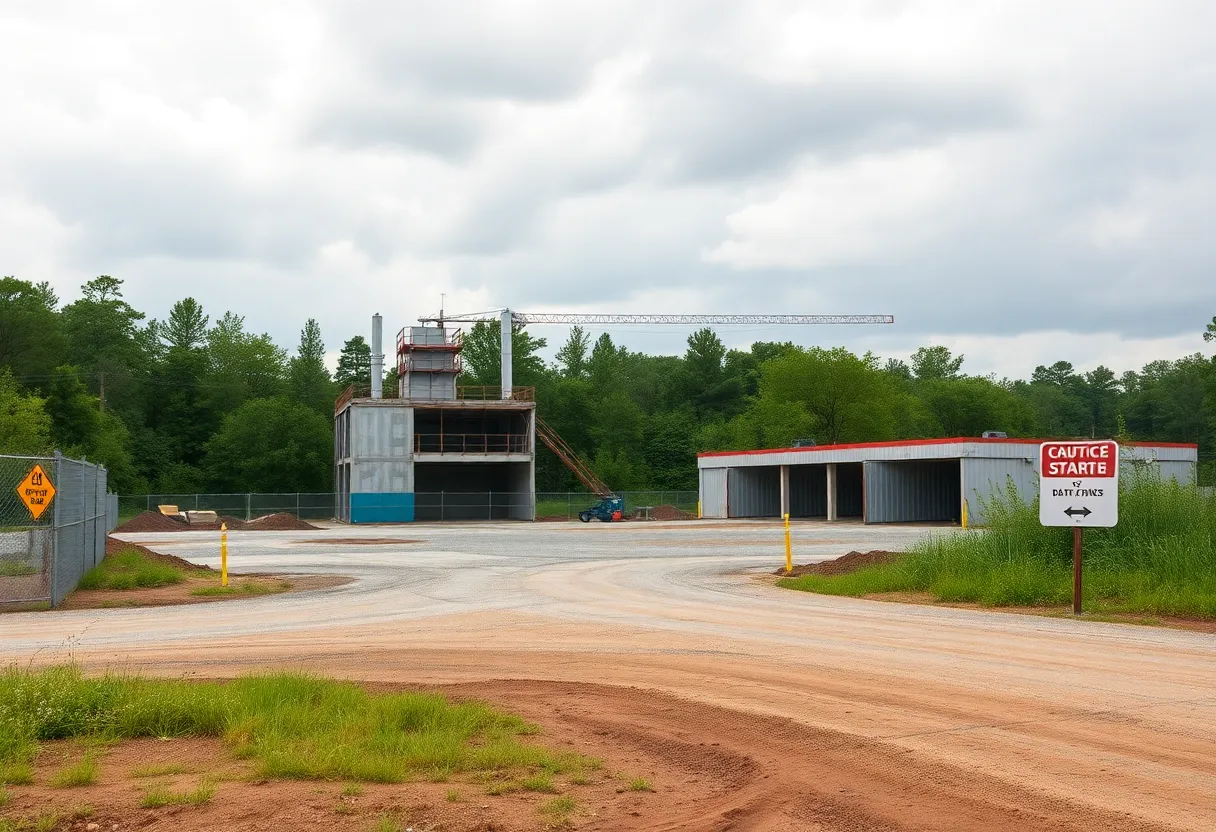AESC
AESC is a Japanese battery technology company specializing in the development and manufacturing of advanced battery cells for electric vehicles (EVs). In 2023, AESC began constructing a major battery plant in Florence, South Carolina, aiming to become a key player in the EV industry by creating approximately 1,600 jobs and making a significant investment of over $1 billion, with plans to reach a total of $1.6 billion. The company has a strategic partnership with BMW to supply battery cells for their EV production facilities. Despite current construction suspension due to policy and market uncertainties, AESC remains committed to its contractual obligations and the future growth of its operations in the region.
News Summary
AESC, a Japanese battery technology company, has announced a temporary halt in construction at its Florence battery plant due to policy and market uncertainties. This decision raises concerns for the facility which was expected to produce significant job growth in the area. With a substantial investment already made, local officials and AESC maintain hope for stabilization in the electric vehicle market to resume construction.
Florence, South Carolina – AESC, a Japanese battery technology company, has announced a temporary suspension of construction at its battery plant in Florence, citing “policy and market uncertainty.” This development, disclosed in a news release on June 5, 2025, raises concerns for a facility that had aimed to be a key player in the electric vehicle (EV) industry.
The Florence facility, which commenced construction in 2023, was anticipated to be completed by 2026 and was projected to create approximately 1,600 new jobs in the area. AESC had already made a substantial investment of over $1 billion in the project and had committed to a total investment of $1.6 billion. The halt in construction was largely influenced by recent market fluctuations and potential policy changes affecting the EV sector.
South Carolina Governor Henry McMaster attributed this construction pause to uncertainties around modifications in tariffs and tax policies that could impact the electric vehicle market. Notably, the U.S. House of Representatives has passed a bill that could potentially eliminate tax credits for electric vehicles, a move that has compounded existing market concerns.
AESC had previously made strategic considerations to scale back its plans for the Florence facility. Originally, the company proposed an additional investment of $1.5 billion, which would have led to the creation of an additional 1,080 jobs. However, with the current suspension, those expansion plans remain on hold.
Despite the pause, AESC remains committed to fulfilling its contractual obligations with BMW, for which it is producing battery cells intended for facilities in the U.S. AESC’s partnership with BMW signifies the importance of the Florence plant in the broader context of EV production, particularly for BMW’s electric vehicles slated for manufacturing in Spartanburg, South Carolina, and Mexico.
From a state support perspective, South Carolina’s government has pledged over $255 million in incentives for AESC’s project. This support includes offers of $121 million in bonds and $135 million in grants, which are unaffected by the current construction halt. Local officials have expressed optimism about the future of the project, emphasizing their commitment to the initiative and the hope to resume work as soon as market conditions stabilize.
As the electric vehicle market evolves, manufacturers like AESC are facing challenges that could impact production and investment decisions. The volatility surrounding government incentives and tax breaks plays a crucial role in determining the feasibility of substantial investments in facilities such as the one in Florence.
Much remains at stake as both AESC and the state’s economy look toward a post-construction phase that is contingent on improved market conditions. The suspension of construction raises questions about the future landscape of the electric vehicle industry in South Carolina and the implications for job creation and economic growth in the region.
In summary, while AESC has put construction on hold for the Florence battery plant, both the company and local authorities remain hopeful for a swift return to progress, aiming to navigate through the current uncertainties affecting the electric vehicle market. The commitment to the project underscores the importance of the Florence facility as a key contributor to the growth of the EV industry, contingent on the stabilization of market conditions going forward.
Deeper Dive: News & Info About This Topic
HERE Resources
AESC Halts Construction on Florence Battery Plant Amid Market Uncertainty
AESC Pauses Construction at Florence EV Factory Amid Market Uncertainty
AESC Pauses Battery Cell Facility Construction in Florence
Florence Welcomes New Electric Car Battery Plant
Florence Expands with New Subdivisions Amidst Water Challenges
Florence Homebuyers Face Challenges Amid Housing Inventory Surge
New Homes Approved in Florence: Planning Commission’s Green Light
Florence Faces New Challenges as AESC Pauses Expansion
Florence’s AESC Electric Car Battery Plant Expansion Halted
Florence County Planning Commission Approves New Homes in Quinby
Additional Resources
- SC Daily Gazette
- Wikipedia: Electric Vehicle Battery
- The State
- Google Search: Electric vehicle manufacturing
- WBTW News
- Encyclopedia Britannica: Electric Vehicles
- Post and Courier
- Google News: Florence South Carolina ev plant

Author: STAFF HERE FLORENCE WRITER
The FLORENCE STAFF WRITER represents the experienced team at HEREFlorence.com, your go-to source for actionable local news and information in Florence, Florence County, and beyond. Specializing in "news you can use," we cover essential topics like product reviews for personal and business needs, local business directories, politics, real estate trends, neighborhood insights, and state news affecting the area—with deep expertise drawn from years of dedicated reporting and strong community input, including local press releases and business updates. We deliver top reporting on high-value events such as the Florence Festival of Lights, Pee Dee Pride, and agricultural expos at the Florence Center. Our coverage extends to key organizations like the Florence Regional Chamber of Commerce and the Pee Dee Area Council of Governments, plus leading businesses in healthcare and retail that power the local economy such as McLeod Health and Pee Dee Electric Cooperative. As part of the broader HERE network, including HERECharleston.com, HEREColumbia.com, HEREGreenville.com, and HEREHiltonHead.com, we provide comprehensive, credible insights into South Carolina's dynamic landscape.





